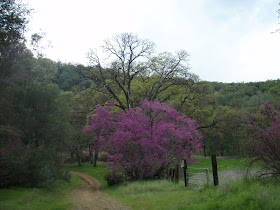 |
| Along the trail in Cache Creek Canyon Regional Park |
This is a little less "breaking news" at this point, but I couldn't resist telling you guys about how amazing dung beetles are! These little guys are using light from the Milky Way to navigate around their habitats! The point of this navigation is to roll the dung ball (a precious resource!) away from the dung pad in as straight of a line as possible. This helps the beetles avoid competition from their potential dung ball stealing fellow. This Science Friday story is worth a listen for several reasons, not the least of which is the great explanation by the study author and the amazing mental image of a dung beetle wearing a Milky Way obscuring hat (just listen, believe me). These sorts of findings are adding to the growing field of sensory ecology. Researchers are learning about how organisms perceive the world, and how that world view, or umwelt, impacts the ecology of different species. It's more than just cool facts too! Sensory ecology can be used to help plan protected areas or understand the impacts of a new development.
I like this article mostly because of the title: Somewhere Over the Brainbow. Thanks NPR. I'm also genuinely intrigued by the idea of a brain activity map. Obama claimed in a speech that this project would help with the treatment of brain disease, specifically mentioning Alzheimer's Disease. The story starts by comparing this project to another major government science initiative, The Human Genome Project. It's an appropriate comparison, I think, but the brain is so complex results will likely be very slow in coming. One issue brought up by the article that interested me was the argument against the project, which stated that such large groups organized by the government aren't the best for science. In any case, I'm excited to follow the story!
If you want to talk about Fracking, pro or con, you should understand how it works. Here is how these wells are supposed to work under ideal conditions.
For more on Fracking, check out the cover story for the March issue of National Geographic. Here is another interesting article by Nat Geo about the same issue but centered in New York. I would love to know some people's opinions. Do you think Fracking has a place in America's energy future? Not at all, or as a stepping stone to more green technologies?
Last, here is an Ecological Society of America press release about one of my very favorite habitats: the salt marsh. Unfortunately, as the press release explains, these already threatened habitats are not doing too swell. Specifically, on the east coast, erosion is slowly eating away at these valuable habitats. This is due, at least in part, to some of the same food web processes discussed in the last EcoNews Round-up. Another contributor to the erosion are drainage ditches meant to draw off standing water in the marsh and, thus, decrease the available breeding ground for mosquitoes. It's a complex problem, but, as so many love to say, that's ecology. It's always very interesting to see how human alterations to an environment have so many unforeseen consequences. This is another excellent example of that phenomenon.
Again, I like to leave these news segments, which can often be kind of depressing, on an up note. Check out this gem sent to me by a friend during finals week. Love.
What do you think? Is there a place for Fracking in America? Do these news round-ups amuse or depress you? Is there any sort of news you would like to see more of on this blog? Probably, you just want more nerdy boys singing about beer. I'm right, aren't I?
No comments:
Post a Comment